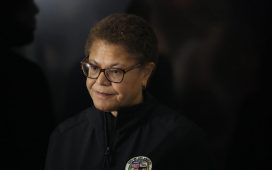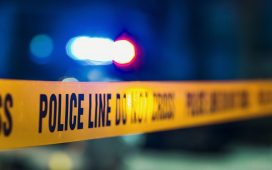With help from Tanya Snyder and Cristiano Lima
PROGRAMMING NOTE: Morning Transportation will not be published on Monday, Jan. 20. We’ll be back on our normal schedule on Tuesday, Jan. 21.
Story Continued Below
Editor’s Note: This edition of Morning Transportation is published weekdays at 10 a.m. POLITICO Pro Transportation subscribers hold exclusive early access to the newsletter each morning at 6 a.m. Learn more about POLITICO Pro’s comprehensive policy intelligence coverage, policy tools and services, at politicopro.com.
— House Democrats agreed with airline ground workers at a committee hearing that working conditions need to get better, but there’s no clear lane for Congress to step in.
— Transportation Secretary Elaine Chao rolled out three initiatives, all related to developments in auto technology.
— A bipartisan bill is taking shape in the House Oversight Committee that would study the federal government’s use of facial recognition and stop agencies from expanding their use of the technology.
IT’S THURSDAY: Thanks for tuning in to POLITICO’s Morning Transportation, your daily tipsheet on all things trains, planes, automobiles and ports. Get in touch with tips, feedback or song lyric suggestions at smintz@politico.com or @samjmintz.
LISTEN HERE: Follow MT’s playlist on Spotify. What better way to start your day than with songs (picked by us and readers) about roads, rails, rivers and runways.
AIRLINE GROUND WORKERS GET THEIR DAY: Workers repping their unions in colorful shirts packed into House Transportation Committee hearing Wednesday as Democrats held what they said was the first hearing on airline ground workers in decades. The picture that emerged is that ground workers (baggage handlers, food service workers and more) are often underpaid and allegedly mistreated, while the airlines that benefit from their services make billions in profit and outsource jobs to contractors with lower wages.
“Many of these essential workers earn as little as $9 an hour,” said House Transportation Chairman Peter DeFazio (D-Ore.). “Sleep in their cars. Some have to resort to public assistance, food stamps. They are at risk with a high rate of injury, sometimes fatal. They can’t afford health insurance. And some even sell blood, plasma.”
One company in particular, Eulen America, was singled out. Eulen, which contracts with airlines for ground services in a number of U.S. airports, has been the subject of fines, investigations and scrutiny in recent months. Eileen Higgins, a county commissioner in Miami, said Eulen workers there told her they were forced to use poorly maintained vehicles without seatbelts and with cockroaches crawling all over them, to clean up human feces and blood without gloves, and to go without water on the tarmac.
Eulen told POLITICO in a statement that it pays its Miami employees a living wage and that safety issues raised by workers are immediately addressed. “The issues raised at today’s congressional hearing are not an accurate portrayal of our operations today,” the company said, calling it an “old and outdated narrative.”
Is there a role for Congress? For now, attention to the issue may be the biggest item on workers’ wish list. Aviation Subcommittee Chairman Rick Larsen (D-Wash.) asked how lawmakers can help, but the immediate focus seems to be at the local level.
DeFazio in a sparring mood: During the hearing, he criticized airlines and lashed out at a Republican witness, anti-union lawyer Russell Brown, who suggested that unions use “corporate campaigns” involving generating negative media against a company. “That was a pretty broad brush,” DeFazio said, noting that in this case, the bad working conditions were well-documented and had been punished by OSHA fines.
GET IT DONE, TRUMP TELLS BOEING: President Donald Trump told Boeing executives to get the grounded 737 MAX back in the air quickly at a White House event on Wednesday. “Get that going. Work together,” Trump told Boeing Chief Financial Officer Greg Smith, according to Reuters. “We’ve got to get that one moving fast and it’s going to be better than ever, I think.” The event was a signing ceremony for the “phase one” trade deal with China, under which Beijing agreed to buy $77.7 billion in manufactured goods over two years, including aircraft.
DRONE LOBBYING UPDATE: Apple has signed prominent drone lobbyist Lisa Ellman, an Obama administration official who now works at Hovan Lovells and leads the Commercial Drone Alliance. Apple was one of the companies selected by the FAA for a three-year pilot program to test applications for drones, and it’s working with North Carolina’s Transportation Department to capture images to improve the accuracy of Apple Maps and monitor traffic in real time. “The documents do not make it clear whether Ellman will lobby for particular agencies or lawmakers, or whether she will push for specific legislation or regulations,” writes Pro Tech’s Steven Overly.
3 ANNOUNCEMENTS: Chao packed three announcements into her 15-minute presentation Wednesday at the annual Transportation Research Board meeting:
— The expansion of a data-sharing partnership between government and the private sector, which initially focused on automatic emergency braking and will now gather data on adaptive cruise control and lane keeping assistance, two primary building blocks of self-driving car technology. This will expand participation to nearly 70 percent of the U.S. automobile market, Chao said.
— DOT endorsed a standardized listing of recommended ADAS terminology that the National Safety Council, AAA, Consumer Reports and J.D. Power are all on board with. Chao indicated that the standardized terminology will ensure “drivers are aware that these systems are designed to assist, not replace an engaged driver.”
— A new pilot program to “equip emergency response vehicles, transit vehicles and related infrastructure, including traffic signals and highway-rail-grade crossings” with vehicle-to-everything communications technology. The deployment will take advantage of the 5.9 GHz “safety band,” perhaps adding a new justification for the FCC to maintain the spectrum exclusively for transportation.
DOC OF THE DAY: A paper out of Virginia Tech calls for more federal funding to increase Americans’ active transportation, like walking and cycling, which makes up about 2 percent of transportation funding.
HOUSE OVERSIGHT BILL ON FACIAL RECOGNITION TAKING FORM: Committee leaders said Wednesday they are moving ahead with plans to unveil a bill to tackle concerns over facial recognition software — offering glimpses of what legislation may look like. “Our committee is committed to introducing and marking up common-sense facial recognition legislation in the very near future,” Rep. Carolyn Maloney (D-N.Y.) said at the session, her first on the topic as chairwoman. Ohio Rep. Jim Jordan, Oversight’s top Republican, likewise committed to advancing a bipartisan bill. “This issue transcends politics,” he said.
Two principles: Jordan offered “broad outlines” that a bill would likely create a mechanism to study the federal government’s use of the software and stop agencies from expanding their deployment of it. Jordan later told reporters that while a bill hasn’t been finalized, an upcoming introduction is likely. “It’s got to happen pretty soon because you want to have a chance to actually have a hearing on the legislation and get it passed,” he said. “I think if we can get it out of our committee, we can get it I think off the House floor.”
MORE PEOPLE, MORE PROBLEMS: As the number of air travelers screened by TSA continues to rise, so does the number of guns they’re trying to bring on planes. The agency said this week that it caught more guns at checkpoints in 2019 than ever before, 4,432 nationwide. That’s a 5 percent increase from the year before. “The continued increase in the number of firearms that travelers bring to airport checkpoints is deeply troubling,” said TSA Administrator David Pekoske.
The more you know: You can bring a gun on a plane, but it has to be unloaded, packed in a hard-sided locked case, declared at the airline check-in counter, and checked, Pekoske said.
Leah Harrelson Graham has joined Uber as senior manager of federal affairs. She previously worked in the George W. Bush White House, the RNC, and most recently Yahoo.
— “Polish authority imposes record fine on Volkswagen over Dieselgate scandal.” POLITICO Pro Europe.
— “Utah eyes personalized license plates after ‘deport’ uproar.” Associated Press.
— “The illustrated encyclopedia of sleeping positions on a plane.” Washington Post.
— “15 states, including Maryland, oppose Trump plan to allow liquefied natural gas shipments by rail.” Associated Press.
— “Radio call to LAX tower raises questions about jet fuel dump over school.” Los Angeles Times.
DOT appropriations run out in 259 days. The FAA reauthorization expires in 1,354 days. Highway and transit policy is up for renewal in 259 days.









